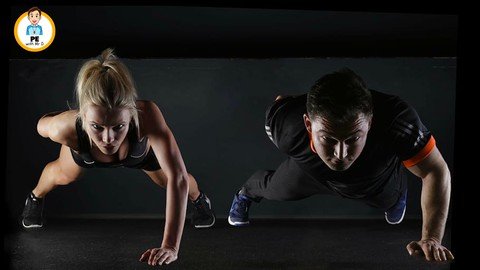
Free Download Exam Preparation Course For Year 12 Vce Pe Units 3-4 | 2022
Last updated 10/2022
MP4 | Video: h264, 1280x720 | Audio: AAC, 44.1 KHz
Language: English | Size: 1.15 GB | Duration: 1h 37m
Make VCE success inevitable!
Free Download What you'll learn
Unit 3: Area of Study 1 - How are movement skills improved?
Unit 3: Area of Study 2 - How does the body produce energy?
Unit 4: Area of Study 1 - What are the foundations of an effective training program?
Unit 4: Area of Study 2 - How is training implemented effectively to improve fitness?
Requirements
Yes, Year 11 Physical Education (Such as Unit 1-2 VCE)
Description
Hello and welcome to this exam preparation course for Year 12 Physical Education Unit 3 & 4 (VCE, HSC, GCSE)My goal for this course is simple: to equip you to pass your upcoming exams.Now, the assumption is that you've been putting in the hard work all in Year 11 and all through this year as well. This course is designed to help you remember most of the key concepts and to get into exam answering mode!In summary, you'll revise these topics:BiomechanicsSkill classificationEnergy SystemsFitness Components and testingTraining PrinciplesTraining MethodsSleep and nutritionThese are the Key Knowledge points that we'll cover in this course (Note, we won't cover them all). For full details, check out the VCE, HSC or GCSE Physical Education Study Design 2018-2024:Biomechanical principles for analysis of human movement including: – angular and linear kinetic concepts of human movement: Newton's three laws of motion, inertia, mass, force, momentum and impulse – angular and linear kinematic concepts of human movement: distance, displacement, speed, velocity, acceleration and projectile motion (height, angle and speed of release) – equilibrium and human movement: levers (force, axis, resistance and the mechanical advantage of anatomical levers), stability and balance (centre of gravity, base of support and line of gravity)Classification of movement skills including fundamental movement skills, sport specific skills, open and closed skills, gross and fine skills, and discrete, serial and continuous motor skillsInfluences on movement including individual, task and environmental constraints on motor skill developmentThe link between motor skill development and participation and performancecharacteristics of the three energy systems (ATP–CP, anaerobic glycolysis, aerobic system) for physical activity, including rate of ATP production, the yield of each energy system, fatigue/limiting factors and recovery rates associated with active and passive recoveriesinterplay of energy systems in relation to the intensity, duration and type of activityfitness components: definitions and factors affecting aerobic power, agility, anaerobic capacity, balance, body composition, coordination, flexibility, muscular endurance, power and strength, reaction time and speedassessment of fitness including: – the purpose of fitness testing including physiological, psychological and sociocultural perspectives – pre-participation health screening (PAR-Q) – informed consent – test aims and protocols – test reliability and validitymethods of at least two standardised, recognised tests for aerobic power, agility, anaerobic capacity, body composition, flexibility, muscular endurance, power and strength and speed.training program principles, including frequency, intensity, time, type, progression, specificity, individuality, diminishing returns, variety, maintenance, overtraining and detrainingtraining methods including continuous, interval (short, intermediate, long and high intensity), fartlek, circuit, weight/resistance, flexibility and plyometricspsychological strategies used to enhance performance and aid recovery including sleep, confidence and motivation, optimal arousal, mental imagery and concentrationnutritional and rehydration recovery strategies including water, carbohydrate and protein replenishmentacute physiological responses to exercise in the cardiovascular, respiratory and muscular systems.The best way to get through this online course is with time, focus and intentionality. Read the instructions carefullyTake notes during the videos using the note tool Do the activities as directed in the videos, don't skip them!Try to get 100% in the comprehension questionsI hope you enjoy this crash course in the key topics in VCE PE Unit 3 & 4!Best of luck!Mr D
Overview
Section 1: Introduction
Lecture 1 Introduction
Section 2: Unit 3: Movement skills and energy for physical activity
Lecture 2 Area of Study 1 - How are movement skills improved?
Lecture 3 Skill Classification
Lecture 4 Biomechanics
Lecture 5 Kinetic Concepts
Lecture 6 Kinematics
Lecture 7 Levers
Lecture 8 Equilibrium
Lecture 9 Area of Study 2 - How does the body produce energy?
Lecture 10 The 3 Energy Systems
Lecture 11 Energy System Interplay
Lecture 12 Acute and Chronic Responses to Exercise
Section 3: Unit 4: Training to improve performance
Lecture 13 Area of Study 1 - What are the foundations of an effective training program?
Lecture 14 Fitness Components
Lecture 15 Fitness Testing!
Lecture 16 Area of Study 2 - How is training implemented effectively to improve fitness?
Lecture 17 S.P.O.R.T Training Principles
Lecture 18 F.I.T.T Training Principles
Lecture 19 Training Methods
Lecture 20 How Training Methods Improve Fitness Components
Lecture 21 Benefits of Sleep
Lecture 22 The Macronutrients
Section 4: Congratulations! What now?
Lecture 23 You've finished this course! So what now?
Year 12 students,Year 11 fast-track students
Homepage
https://www.udemy.com/course/year-12-physical-education-exam-preparation/
Buy Premium From My Links To Get Resumable Support,Max Speed & Support Me
Links are Interchangeable - Single Extraction
Comments

